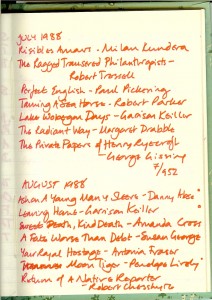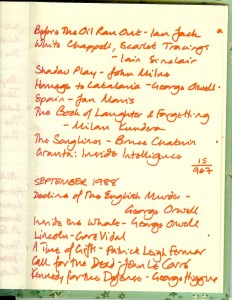As I was listening to the report on the radio this morning about Aung San Suu Kyi’s first visit to the UK in 24 years, it set me thinking about how much has changed since 1988. The London of those days – a city to which I’d recently moved from the US – was dirtier, not as lively, far less cosmopolitan. We were all much poorer, even the bankers, well worth remembering in the midst of the crisis. According to the new IFS and Joseph Rowntree Foundation study, 3.4 million children here lived in poverty in 1988-89, down to 1.7 million in the latest figures (still too high, but the biggest decline in the years since 1961 when the data start).
Personally, 1988 is so long ago that I was still doing macroeconomics, and hadn’t yet quite begun my 13-year journey in journalism. I had just met the man who became my husband, and our now grown-up eldest son hadn’t been imagined yet. And here is what I was reading in 1988. Some good stuff among the detective novels. Ian Jack’s [amazon_link id=”0099754215″ target=”_blank” ]Before the Oil Ran Out[/amazon_link] is a marvellous piece of reportage about how Britain had been changing in the 1980s. I was obviously also in the middle of a lot of travel writing and a [amazon_link id=”0141183063″ target=”_blank” ]George Orwell[/amazon_link] fest.

July 1988 books

August 1988 books

You say we were all much poorer and many more children lived in poverty and figures can indeed show that. But I’d like to challenge the ideas and calculations that lead to such a conclusion
I can remember the Scotswood Road just after the second world war, (famously remembered at the start of each “Likely Lads” episode as it was being demolished in the 1960s.) That’s poverty! No running water, no bathroom, no shoes but a pub on every corner. And yet, and yet. The number of children who couldn’t read, write and say their 9 times table by the age of eight was very, very small. And my primary school class had 64 souls in it!
By the 80s we didn’t have much money but I dare to suggest few regarded themselves as “in poverty” as the economists seek to define it. One of the main factors was that there was not the vast amount of personal debt that can be found now. Equally, it was still possible to find a “real” full time job without great difficulty, Now, for a variety of reasons, lots of folk can be defined as “hard up” The nation has adjusted its expected standard of living to an income from two wage earners in a household. In the 60s that was rare, in the 80s, just becoming commonplace. And, dare I say it, the open borders of the EU have made it possible for depression of wage rates to a level which cannot fund existing debt and mortgages
But widespread poverty? I’m sorry, but I think the economist’s present method of calculating what constitutes poverty needs revision
And, as for books? Well the read of the 80s was surely Peter Wright burgling his way across London. We can all read it now, but I had to buy my copy in Cyprus and the (efficient) border controls at Heathrow had instructions to confiscate it if they came across it when asking if I had more than 200 cigarettes